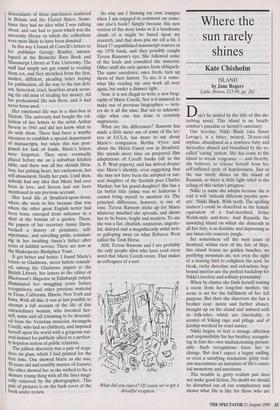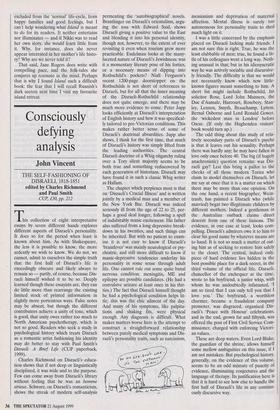Where the sun rarely shines
Kate Chisholm
ISLAND by Jane Rogers Little, Brown, £15.99, pp. 261 Don't be misled by the title of this dis- turbing novel. This island is no beach- comber's paradise or hermit's sanctuary.
Our heroine, Nikki Black (aka Susan Lovage), is a bitter, twisted, 28-year-old orphan, abandoned as a newborn baby and thereafter abused and brutalised by the so- called 'caring' system. She has come to the island to wreak vengeance — and thereby, she believes, to release herself from her self-inflicted cycle of hopelessness. Just as the sun rarely shines on the island of Ruanish, so there is little light relief in the telling of this victim's progress.
Nikki (a name she adopts because she is told it will 'unleash different psychic pow- ers': 'Nikki Black. With teeth. The spelling matters') could be described as the female equivalent of a foul-mouthed, Irvine Welsh-style anti-hero. And Ruanish, the unwitting island on which she descends in all her fury, is as desolate and depressing as any inner-city concrete jungle.
Set somewhere off the west coast of Scotland, within view of the Isle of Skye, this island boasts no golden beaches, no purifying mountain air, not even the sight of a soaring bird to enlighten the soul. Its bleak, rocky shoreline and colourless, bog- bound interior are the perfect backdrop for Nikki's loveless and solitary personality.
When by chance she finds herself renting a room from her long-lost mother, the scene is set for the fulfilment of her fell purpose. But then she discovers she has a brother (cue: incest and further abuse), brought up on the island and imbued with its folk-tales, which are (inevitably, it seems) of Viking rape and pillage and of kinship wrecked by cruel nature.
Nikki begins to feel a strange affection and responsibility for her brother, recognis- ing in him her own malfunctioning person- ality. Such recognitions force her to change. But don't expect a happy ending, or even a satisfying resolution: gritty real- ism necessitates an imitation of life's essen- tial monotony and messiness.
The trouble is, gritty realism just does not make good fiction. No doubt we should be disturbed out of our complacency and shown what life is like for those who are excluded from the 'normal' life-cycle, from happy families and good feelings, but I can't help wondering what Island is meant to do for its readers. It neither entertains nor illuminates — and if Nikki was to read her own story, she would learn little from it. Why, for instance, does she never appear interested in her mother's life histo- ry? Why are we never told it?
That said, Jane Rogers does write with compelling pace, and the folk-tales she conjures up resonate in the mind. Perhaps that is why I found Island such a difficult book: the fear that I will recall Ruanish's dark secrets next time I visit my favourite island retreat.



























































 Previous page
Previous page